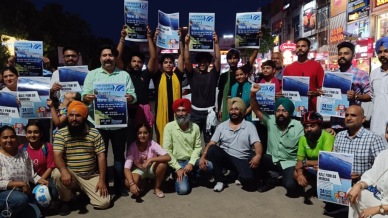Stay updated with the latest - Click here to follow us on Instagram
Punjab, Haryana, Rajasthan activists find support from farmer unions for ‘Kale Pani Da Morcha’ against Buddha Nallah’s contaminated water
The Buddha Nallah, originating from Koom Kalan in Ludhiana, is notorious for carrying industrial effluents and untreated waste through its 34-kilometer course, with nearly half of it passing through the city.

In a unified show of strength, environmental activists from Punjab, Haryana, and Rajasthan are set to gather in Ludhiana on Saturday for a day-long protest against the severe water pollution plaguing the Sutlej River. The protest, dubbed ‘Kale Pani Da Morcha’ (War Against Water Pollution), is a response to the persistent contamination of the river by the polluted waters of the Buddha Nallah, a seasonal stream that flows through Ludhiana before merging with the Sutlej.
The protest is being spearheaded by the Public Action Committee, Naroa Punjab Manch, and several other organizations, with the support of all major farmer unions in Punjab, including the Samyukta Kisan Morcha, Kisan Mazdoor Morcha, and the Samyukta Kisan Morcha (non-political). Despite their ideological differences, these groups have come together for the common cause of ensuring clean drinking water for the people of Punjab and beyond.
“We deserve to drink safe water—this is a basic requirement of any person,” said Jaskirat Singh of Naroa Punjab Manch. “We had no choice but to shake this government by organising the Kale Pani Da Morcha, as we want to save our river waters.”
The protest will see participants gathering at the Verka Milk Plant in Ludhiana and marching a three-kilometre stretch to Bhai Bala Chowk. Environmental activist Kuldeep Singh Khaira confirmed that farmer unions from Haryana would also be joining the march, further strengthening the demonstration’s impact.
The infamous Buddha Nallah infamous
The Buddha Nallah, originating from Koom Kalan in Ludhiana, is notorious for carrying industrial effluents and untreated waste through its 34-kilometer course, with nearly half of it passing through the city. It ultimately merges with the Sutlej River at Walipur Kalan, contributing to the pollution that flows downstream into Rajasthan.
Water from the Sutlej, collected at the Harike Barrage in Ferozepur, is distributed to various parts of Malwa in Punjab and 15 districts in Rajasthan through an intricate network of canals.
Residents of Malwa and Rajasthan, including top officials such as the Chief Minister of Rajasthan, have long complained to Punjab’s government about the contaminated water being supplied through these canals. In Rajasthan, water from the Harike Barrage is channelled through the Bikaner Canal, Gang Canal, and Bhakra Canal to districts like Ganganagar, Hanumangarh, Bikaner, Jodhpur, and Jaisalmer.
“Hence on Saturday, a huge gathering is coming from Ganganagar district of Rajasthan to Ludhiana under the banner of Dushit Jal Asurakshit Kal Jan Jagran Samiti,” said Rajat Swami from Ganganagar. “We have been raising the issue for a long time now. It is good that environmental organisations of Ludhiana took this initiative and organized this event,” Swami added.
Farmers from Fazilka district and other south west parts of Punjab, which also rely heavily on canal water for both irrigation and drinking, are expected to participate in large numbers. “Our area is dependent on canal water, and we have protested a lot due to brackish water coming in canals regularly,” said Sukhmander Singh, president of BKU Rajewal in Fazilka district.
What contribute to the pollution
Ludhiana’s extensive industrial base, including over 500 dairy farms and 800 dyeing units, has been identified as a major contributor to the pollution of Buddha Nallah. Despite the installation of Common Effluent Treatment Plants (CETPs) by dyeing units and Sewerage Treatment Plants (STPs) by the municipal corporation, the presence of heavy metals like lead and chromium in the water raises serious concerns.
“Industrial units say they have installed CETPs, and the municipal corporation says they have installed STPs, but the colour of the water clearly tells that it is highly polluted,” said Jaskirat Singh. “As there has been no accountability from anyone, we have finally given a wake-up call to the government to provide us clean drinking water. Hence, this morcha has been organized,” Singh added.
In the days leading up to the protest, a series of awareness events have been held in Ludhiana, including street plays performed by artists from Tagore Theatre, Chandigarh, and a poster competition aimed at highlighting the urgency of the situation.